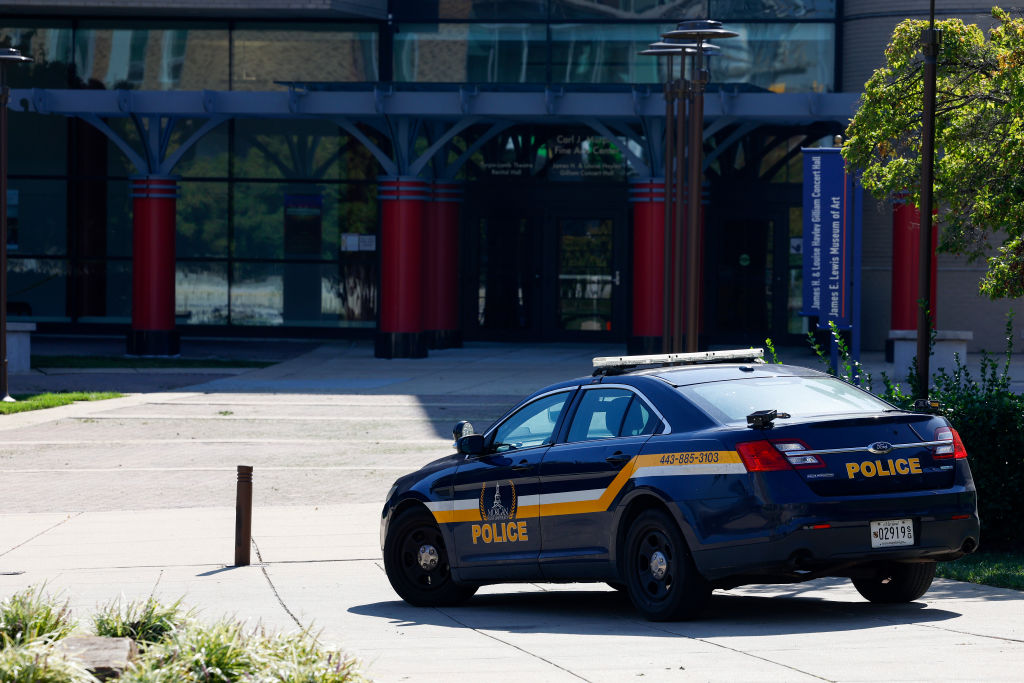Morgan State Shooting: Protecting HBCUs Requires Urgent Steps
Op-Ed: Urgent Measures Are Needed To Protect HBCUs

A Morgan State University campus police car sits in front of the Murphy Fine Arts Center on October 4, 2023, in Baltimore, Maryland, one day after a mass shooting broke out on campus. | Source: Anna Moneymaker / Getty
Historically Black colleges and universities (HBCUs) have once again found themselves vulnerable to attacks from white supremacists and troublemakers within their local communities because of an unsettling convergence of ongoing economic stressors, racial tensions and a recent Supreme Court decision that overturned affirmative action policies.
The previous several semesters have seen a rise in violence against students inside these vital academic havens as enrollment at Black colleges across the nation continues to soar. Robberies, assaults, stabbings and even shootings are just a few of the incidents.
Morgan State mass shooting
Just last week, a shooting incident left five people injured in Baltimore, forcing Morgan State University to cancel its weekend homecoming activities and classes. The school has never had homecoming festivities canceled until this year.
Consequently, some students were seen leaving campus with their bags packed, and the campus had a ghost town-like appearance. This reaction is essentially the result of the trauma that students went through when SWAT forces barged into their dorm rooms brandishing weapons, and their worry of continuing to live in fear of the gunmen still on the loose. Administrators at the university have expanded services in the wake of this catastrophe, emphasizing the value of adaptable teaching methods for people who are still dealing with the fallout.
The victims, which included four students, were not the intended targets, according to Baltimore’s police commissioner Richard Worley. No arrests had been made as of Sunday morning.
The shooting incident, which took place after a late-night argument, is a sharp reminder of the vulnerability of HBCUs, some of which have open campuses, and half of which are in majority-Black communities where crime is a persistent problem that is made worse by more general economic stressors. It is significant to remember that the pervasive legacy of racism has long left HBCUs vulnerable. These institutions are now located either in rural locations where they sought protection from dangers or in the middle of impoverished metropolitan communities because of this legacy.
Howard University struggled with a violent brawl close to its residence halls earlier in the semester. During the altercation, one student was stabbed, and numerous others were hurt. Students said that a victim was allegedly observed lying injured by a security officer who failed to intervene.
The university police chief announced plans to increase campus security in reaction to the incident, including the installation of over 1,000 cameras, card readers for building access control and the stationing of armed policemen at residence buildings. Additionally, emergency call devices have been made available to both personnel and students.
Students, staff and faculty have expressed worries about their safety when walking the campus at night, fearing theft, or unintentionally becoming involved in a risky firearm situation. Some people continue to think they are responsible for their security, despite the aggressive steps taken by campus law enforcement authorities to raise awareness.
The effect on HBCUs’ communities
There has been a dramatic change in the area around Howard University’s main campus. Small Black-owned businesses that once dominated this neighborhood are no longer present, with fewer decaying buildings and other indications of neglect. High-end residential complexes and hip cafes have now sprung in their stead. In recent years, Howard has intentionally sold off some of its surrounding properties and rented land to increase its financial resources and assure its survival.
Due to these modifications, low-income people have unintentionally been forced out of their affordable housing units and problems with homelessness and substance misuse have worsened, putting those who are impacted closer to the campus. Unfortunately, these changes have stirred resentment within local communities towards students who come from various parts of the country and around the world. This has also resulted in campuses becoming hotspots for individuals looking to express their frustrations and anger.
Some HBCUs have inadvertently contributed to the acceleration of gentrification, but they are also stimulating discussions about their status in communities. What does belonging to a community entail? How can we interact with and support our neighborhoods? These discussions go deep into what it means to study, work and do research on issues of race and social justice while attempting to improve our communities. These activities take place in campus areas where people must remain in a state of hypervigilance, which can take a toll on mental health and productivity.
Threats to HBCUs
In early August, there was an incident at Edward Waters University in Jacksonville that could have led to a potential mass shooting. The gunman, a young white man with swastikas on his rifle, was spotted by students as he prepared to carry out an attack. Campus police intervened, prompting the assailant to flee. Tragically, he later carried out a deadly attack at a nearby Family Dollar store, claiming the lives of three Black individuals.
Adding to the concern, in April, a white man was arrested on the campus of North Carolina A&T State University with a cache of weapons and ammunition. The individual’s threatening behavior towards security guards highlighted the urgent need for comprehensive security measures at HBCUs.
Over the last year, there has been an uptick in bomb threats nationwide, with dozens of them targeting historically Black colleges and universities. These threats have had a profound impact on the sense of security on HBCU campuses. The FBI investigated bomb threats targeting over 20 HBCUs across various states, encompassing Alabama, Arkansas, Delaware, Florida, Georgia, Kentucky, Louisiana and Mississippi. They labeled these incidents as “hate crimes” and “racially or ethnically motivated violent extremism,” while HBCU leaders spent months demanding charges and pressing for state and federal funds to protect their campuses from threats.
In March, four HBCUs based in Atlanta initiated efforts to enhance their security measures, striving to create safer campus environments. Students at Morehouse College and Clark Atlanta University voiced concerns regarding outdated emergency posts and insufficient communication between campuses during emergencies.
In August 2022, the Department of Homeland Security (DHS) expressed its commitment to addressing bomb threats specifically targeting HBCUs. DHS has implemented various initiatives to bolster security at some Black colleges. In August, DHS committed $250 million through the Nonprofit Security Grant Program to enhance physical security for nonprofit organizations at high risk of terrorist attacks. This funding was allocated with $125 million for nonprofits in designated urban areas and another $125 million for nonprofits outside those areas. Additionally, DHS’s Cybersecurity and Infrastructure Security Agency (CISA) has developed resources and conducted training to equip HBCUs in responding to bomb threats, enhancing active shooter preparedness, and facilitating engagement with law enforcement. Furthermore, DHS initiated the HBCU K9 Bomb Detection Adoption Program and engaged in extensive outreach efforts to support HBCU leaders, staff, and law enforcement at the state and federal levels.
In May, the U.S. Department of Education announced Project School Emergency Response to Violence (Project SERV) grants for four HBCUs affected by bomb threats in the previous year. Texas Southern University, Delaware State University, Claflin University, and Howard University received varying amounts to enhance mental health services, safety measures, and wellness programs on campus. The grants aimed to help HBCUs recover from the disruptions caused by the bomb threats and create safer, supportive learning environments. The Department also expressed its ongoing commitment to supporting HBCUs through various initiatives and funding efforts.
The President of Edward Waters University met with the Governor of Florida, who gave the school $1 million to beef up security after the Jacksonville murders. The school’s president highlighted the urgent need for action from federal and state elected officials to ensure the safety of HBCUs and their ability to fulfill their educational mission.
Leaders of the United Negro College Fund (UNCF) stressed the ongoing need for consistent actions to safeguard HBCUs in the face of racially motivated threats observed throughout 2022. They urged Congress to pass the Homeland Security appropriations bill, incorporating specific provisions directing the Federal Emergency Management Administration (FEMA) to annually allocate $100 million to HBCUs through the nonprofit grants’ security program. UNCF urged that these funds should be directly administered to HBCUs, bypassing state governments, to bolster security, formulate comprehensive response strategies, leverage technology for monitoring campus access, and cultivate secure learning environments that prioritize students’ mental well-being and safety.
Enhancing security at Black college campuses
Improving campus security at historically Black colleges and universities is of paramount importance to ensure the safety and well-being of all individuals within these academic communities. Firstly, enhancing physical security measures is essential. Conducting comprehensive security assessments to identify vulnerabilities and employing state-of-the-art surveillance technology, controlled entry points, and improved lighting can significantly bolster campus safety. These measures contribute to a secure environment that instills confidence among students, faculty, and staff.
Moreover, fostering community engagement and collaboration is key. Building strong relationships with local law enforcement agencies and involving the campus community in neighborhood watch programs can create a united front against crime. Collective efforts, including regular safety education programs and crisis management drills, empower individuals to recognize potential threats and respond effectively during emergencies. Additionally, employing well-trained security personnel and leveraging advanced security technologies further fortify the safety infrastructure.
Lastly, considering modifications to the campus layout and open campus model can be prudent. Conducting a thorough review and potentially restricting access points can enhance control over who enters and exits the campus. Implementing identification card systems and employing technology-enabled solutions offer effective ways to monitor and manage campus access. By continuously evaluating and adapting security strategies, HBCUs can create an environment where learning and growth can thrive, supported by a foundation of safety and community collaboration.
Given the recent events, it is crucial to respond comprehensively. As HBCUs face an increase in violence and threats, swift action is imperative to safeguard their students’ academic pursuits as well as their overall well-being. The gravity of this situation cannot be overstated; it necessitates an effort to ensure the security of these vital institutions. As HBCUs experience a resurgence it becomes essential to implement solutions while fostering collaboration among all HBCUs. Failing to do so would mean missing out on an opportunity, for progress and advancement at a time when these institutions are desperately needed.
Dr. Stacey Patton is an award-winning journalist and the author of Spare the Kids: Why Whupping Children Won’t Save Black America.
SEE ALSO:
HBCU Unity: Black Colleges Show Solidarity With Morgan State University After Campus Shooting
How Howard University Students Found Happiness During A Chaotic School Year
















